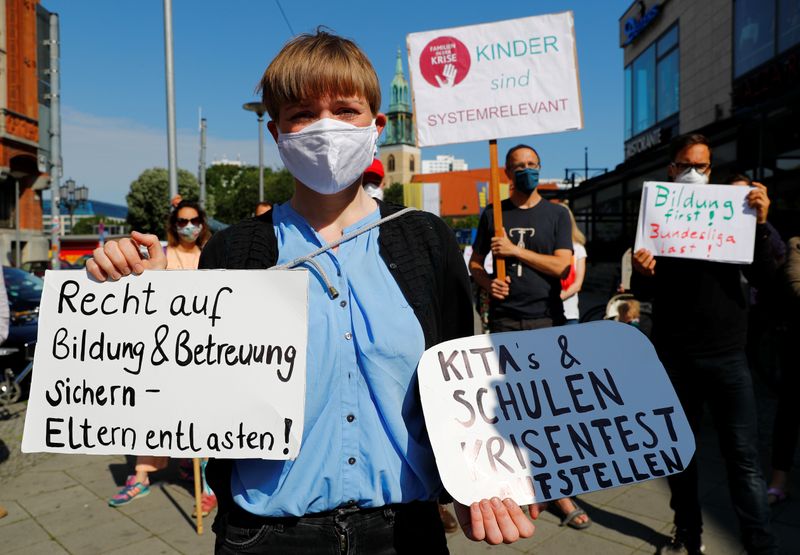By Emma Thomasson
BERLIN (Reuters) - Manage a global team of 3,500 people? No problem, says Katrin Lehmann, head of customer innovation and maintenance at German business software company SAP.
Do it while looking after four kids, including home schooling 10-year-old Benno? It almost finished her off.
"I was going nuts," she said. "All of them eat different things and they all complain, whatever you do. I said, right: cornflakes for lunch."
Germany experienced far lower death rates than other large European countries from the coronavirus, and has been quicker than many to begin easing lockdown measures. But schools have been slow to reopen, and working parents are getting fed up.
Dozens of parents, many with young children in tow, protested outside the Berlin city hall on Tuesday to call on the local government to do more to help families, carrying placards including: "Open the schools or mum will lose her cool."
"We can't carry on like this. We need relief," said Sabine Ponath, a parliamentary researcher and mother of two.
German schools started slowly reopening in late April, but many pupils are still back only for a couple of hours a week as schools split classes to observe social distancing rules. Daycare provision for younger children is even more limited.
A survey published by the DAK health insurance group last week showed that 81% of parents and 62% of children support the gradual reopening of schools, with about half of parents reporting feeling exhausted most days due to home schooling.
Schools should reopen, "not for myself to be able to work, but more for the kids. Their routine is totally messed up," said Michael Stempin, head of brand management at price comparison firm Idealo, who spends two hours a day home schooling.
The Institute for Employment Research estimated that by the end of April some 56 million days of work were lost in Germany due to the closure of nurseries and schools.
WOMEN'S CAREERS UNDER PRESSURE
Women are bearing the brunt of home schooling and extra housework, according to surveys. That hurts efforts to promote diversity and narrow Germany's gender pay gap.
Job satisfaction of mothers has fallen by 5 percentage points more than that of fathers during the crisis, and they are more likely to have cut their hours or stopped working, according to a survey by the Berlin Social Science Center (WZB).
"Just as before the crisis, it is often the women who are putting back their careers to be there for the children," said WZB's social science Professor Lena Hipp, herself trying to fit in work around caring for three young children.
At SAP, co-CEO Jennifer Morgan, a mother of two, stepped down in April after only six months as the first female head of a German blue-chip company, leaving Christian Klein in charge.
SAP gave no reasons for her departure though Chairman Hasso Plattner suggested one leader was needed in this time of crisis. Klein, for his part, has made a point of mentioning his children at board meetings.
SAP has been monitoring the gender impact of the crisis. It says more women than men received promotions during March and April.
"Productivity has stayed the same but people are paying a higher price than in non-corona times, and how long they can keep it up will depend on relief for parents when schools can restart," said Cawa Younosi, the company's head of human resources in Germany.
Lehmann, working from home in Heidelberg in southern Germany, sees one positive upshot: the crisis has encouraged people to be more honest about the challenges of juggling a career and family.

"It is OK that you have a screaming kid in the background or a dog running around," she said. "Now I am talking about my kids with my team quite a lot so they can see it is possible to have kids and responsibility in the company."